
USA grabs the lead in S50; Germany Lasker Schachstiftung GK tops the standings with a perfect score in the S65 section.
In Round 6, the number of draws remained the same, but what increased was the number of blunders.
In the duel of the leaders, USA and Iceland, both on 9 points, the Americans made solid draws with Black on boards two and four, Kaidanov (2549) drawing Petursson (2396) and Yermolinsky (2419) drawing Thorallsson (2382), but this didn’t mean that their players with the white pieces had everything under control.
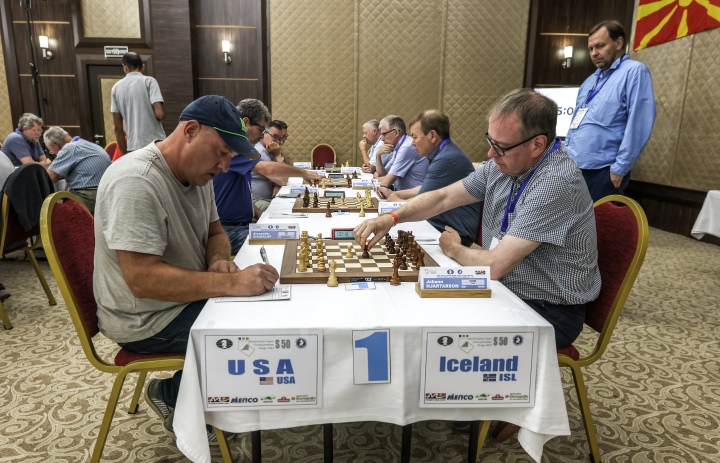
True to his creative style, Shabalov (2465) found ways to unbalance even the slow and strategic Chigorin Variation of the Ruy Lopez. However, Hjartarson (2432) was up to the task, and the complexity of the position made the evaluation swing drastically. Both players missed chances, but none too obvious.
Here’s the last moment in the game when Black could have won.
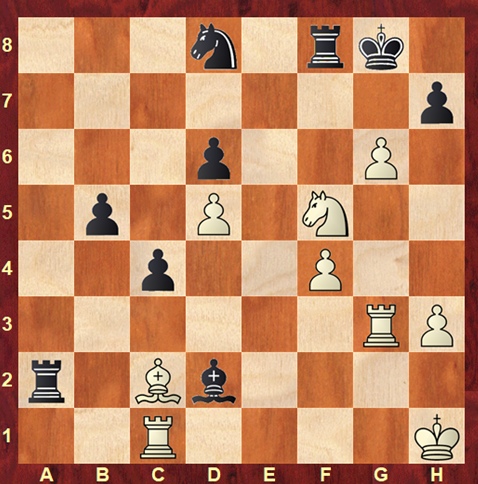
The mess is obvious. White’s last move. 41.Ne3xf5 was a mistake. Better was to play 41.Rcg1, but even there, the position continues to be extremely complicated.
In the position on the diagram, Black should have taken on f4 (instead of g6 as in the game) and after 41…Bxf4! 42.Rg4 Bxc1 43.Ne7 Kg7 44.gxh7 Kf7 45.Ng8 Bb2! manages to stop the h-pawn from promotion.
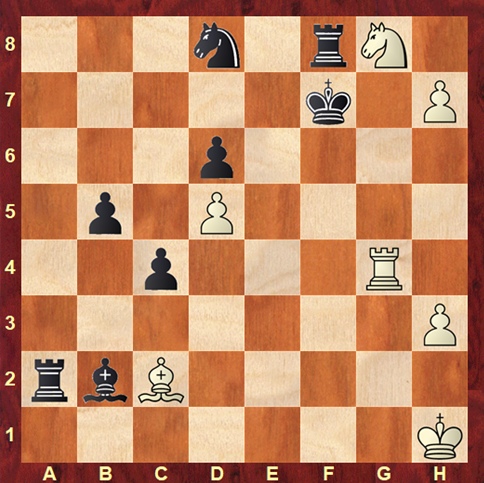
In spite of being a full rook down, White can continue to create problems with 46.Bg6 Kg7 47.Be4 Kh8 48.Ne7, etc., but objectively Black should win.
By taking on g6 Black allowed a pretty and very unusual construction that forced a perpetual check.
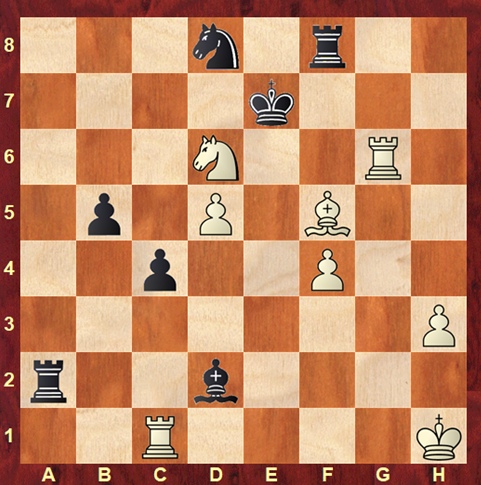
White’s last move was 44.Bf5 and after Black took the rook, White gave perpetual with Nc8-d6. A unique harmony of the white pieces!
The decisive win was scored by Ehlvest (2530) on board three against Arnason (2419) in another Ruy Lopez. White obtained an advantage after the opening in which Black missed an important zwischenzug and from then on, it was a game with only two results possible: a win for White or a draw. Ehlvest was not always very precise, letting his advantage slip away, but that was never obvious, and Black failed to make the most of his chances. The critical moment was just before the time control.
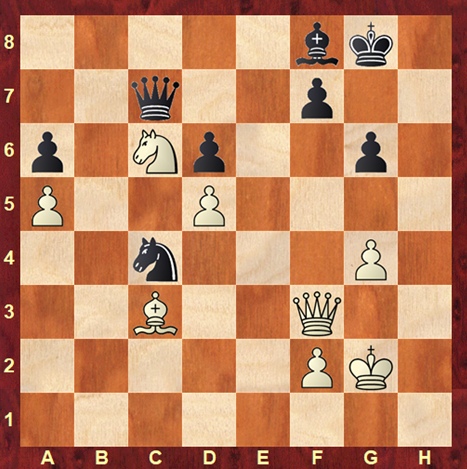
White has just played 39.Bc3, threatening Qf6. Black’s only move was 39…Ne5, but he vacillated for one move too long with 39…Qd7? after which 40.Qe4 (40.Qh3 was even stronger) followed by Qd4 led to White soon winning a pawn.
The rest of the game was exemplary, with the final zugzwang illustrating the domination of the bishop over the knight.
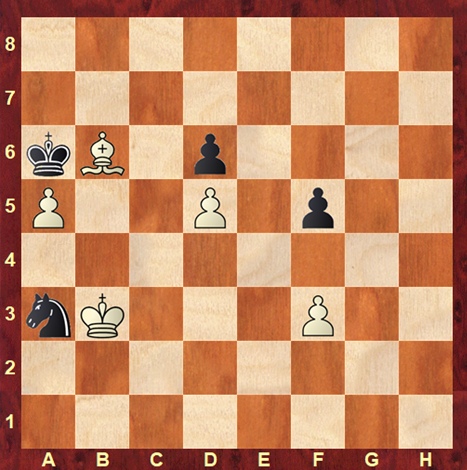
Black chose 67…Nb1 and lost the knight after 68.Be3 and Kb2, but going to b5 wasn’t much better, as after 68.f4 Kb7 69.Kc4 Ka6 70.Kb4 Black ends up in a lost pawn endgame as the knight has no moves.
An extremely important win for the USA, now leading the event as sole leaders.
The match between Italy and Austria was riddled with blunders.
The first game to finish was on board four, where Denk (1581) didn’t really have to lose in mere 7 (!) moves to Borgo (2333).
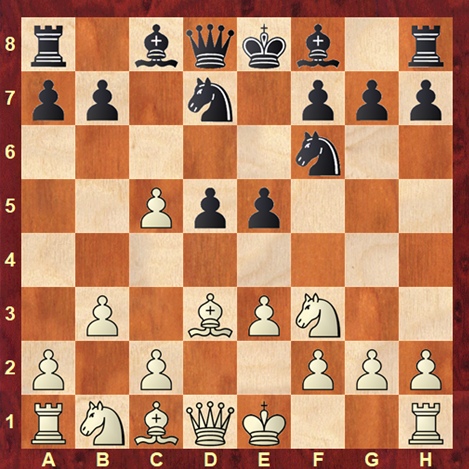
White didn’t play the opening too well, but there was no need to play 7.Bb5?? After 7…Qa5+ Black won the b5-bishop. Denk resigned.
Soon after, Opl (2151) blundered against Bellia (2388).
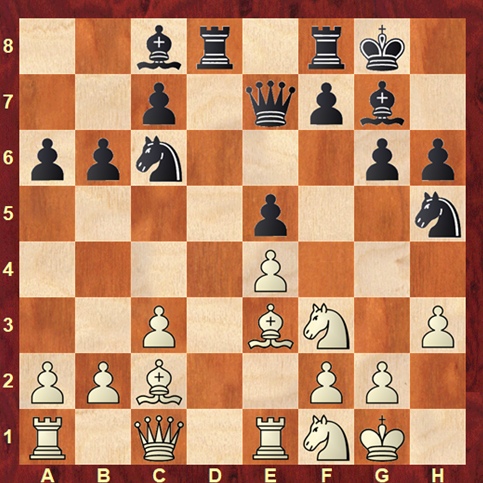
Instead of the normal 19…Kh7, defending the pawn on h6, Black went for a “combination”. He played 19…Qf6? and after 20.Bxh6 Bxh6? (sticking to his plan) 21.Qxh6 delivered his shot 21…Bxh3, missing however 22.Ng5, both threatening with checkmate on h7 and attacking the bishop on h3.
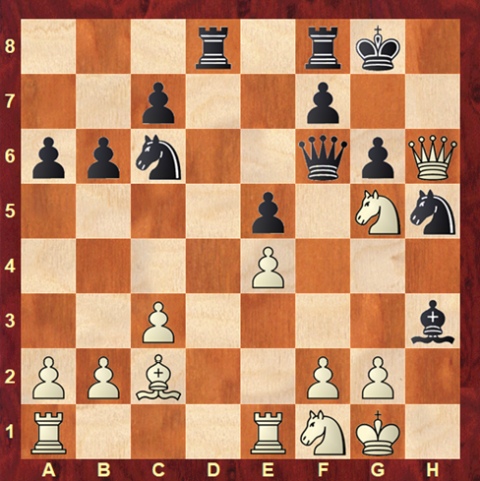
Naturally, Black resigned.
On board two Ortega (2410) perhaps thought that the Austrians had been too kind. Against Druckenthaner (2182) he had the advantage, but misplayed it and reached the following position.
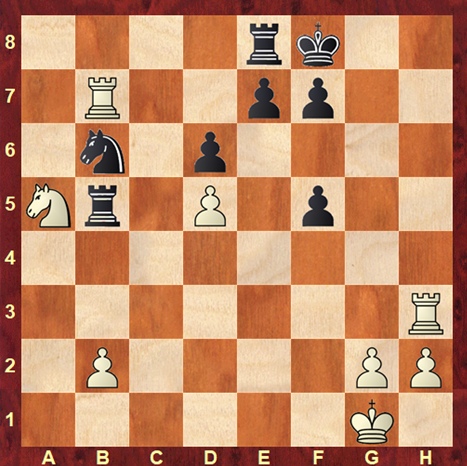
After 35…Rxa5 36.Rh8 Kg7 37.Rxe8 Nxd5 Black should draw, but instead, he chose the suicidal 35…Ra8?? 36.Rh8 Kg7 37.Rxa8, which left him a full rook down.
The stabilising presence on board one was Godena (2429), who managed to draw from a winning position a full exchange up against Denk (2186).
It should have been a convincing win, but even a minimal one would do for the Italians, who are now second, only a point behind USA.
The match between North Macedonia Alkaloid and England 1 was no less dramatic.

On board one Adams (2662) seemed to surprise Georgiev (2542) in the opening and quickly took the initiative with the black pieces. The initiative was transformed into an extra pawn that Michael carefully nurtured to a win in 60 moves, without allowing his opponent a single chance.
There were two relatively calm draws on boards two and four, where neither Emms (2448) could pose serious problems to Bogdanovski (2385) nor Davies (2354) could create much against Kutirov (2274).
All the drama unfolded on board three in the game between Stanojoski (2351) and Arkell (2352).
Playing his favourite Caro-Kann, which was met by Stanojoski’s favourite Exchange Variation, Arkell was fine after the opening, but allowed White to expand too much on the queenside. Then it was White’s turn to mess things, and he did so badly.
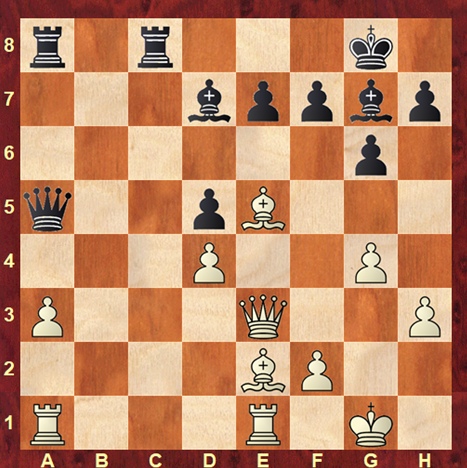
The knight jump to e5 was bad as after the exchange there Black now played 25…Rc3! The queen had to go to f4 since 26.Qd2? Rg3 loses. After 26.Qf4 f6! 27.Bb8 Rcc8 suddenly the bishop was trapped on b8 and Black was a clear piece up!
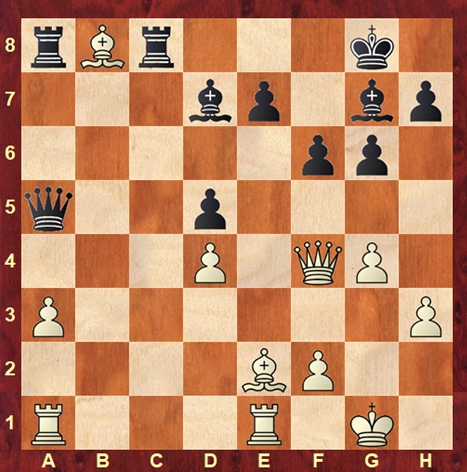
Stanojoski continued as if nothing had happened and Arkell started to play passively, moving his pieces to the last rank. He was still winning, but it was obvious that he wasn’t getting closer to victory.
Then, just before the time control, he blundered all of his advantage.
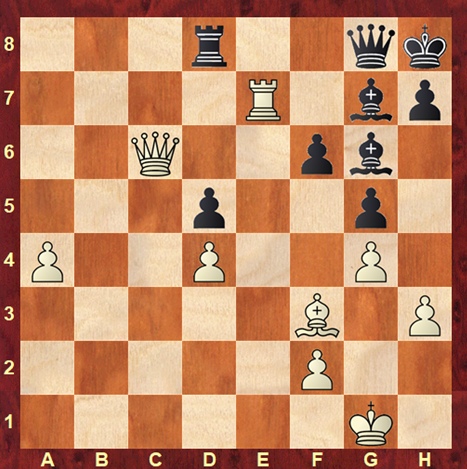
Instead of 38…Qf8 or 38…f5, he played 38…Be4? (which was good some moves earlier) and after 39.Bxe4 dxe4 40.a5 all of a sudden, White was not lost anymore!
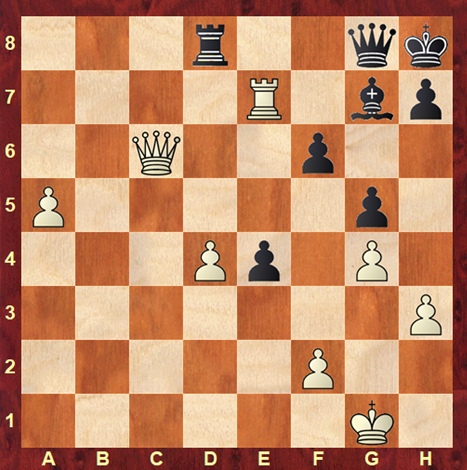
The activity of White’s pieces, the passed a-pawn and the passivity of the black pieces balance each other out.
Arkell continued to play with a great degree of hesitation and soon enough blundered again.
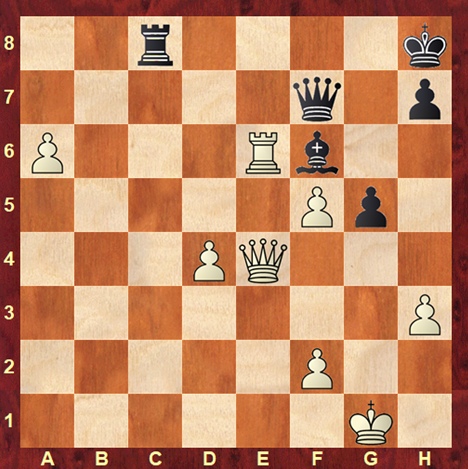
Here, probably the simplest was 44…Rf8, avoiding any tricks based on Rxf6, but moves like 44…Kg7 or 44…Rc1 were fine too. Instead, after 44…Rc7? 45.Rb6! with the threat of Rb7 White was winning!
Probably in a state of shock, Black played 45…Re7, allowing a beautiful combination.
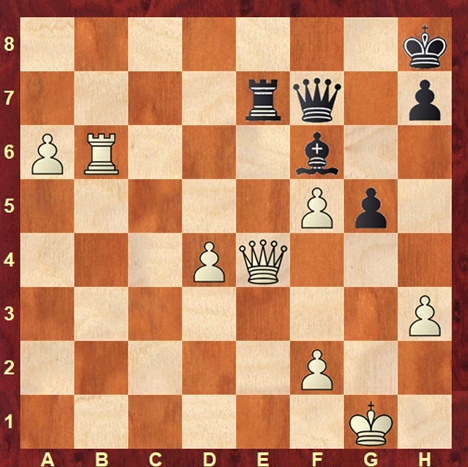
White crowned the complete turnaround with the spectacular 46.Qxe7!! when the promotion of the a-pawn cannot be stopped, either after 46…Bxe7 47.a7 Qd5 48.Rb8 followed by a8Q (this was played in the game) or after 46…Qxe7 47.Rb8 Kg7 48.Rb7.
White won the exchange and, soon enough, the game.
A dramatic finish! What should have been a winning match for England turned out to be a great save for North Macedonia Alkaloid!

In the S65 section, Germany Lasker Schachstiftung GK continued their winning streak.
It was surprising to see Grunfeld connoisseur Ftacnik (2452) blown off the board in his opening against Knaak (2438) on board one in the match between Germany Lasker Schachstiftung GK and Slovakia.
Perhaps surprised in the opening, Black quickly ran into trouble.
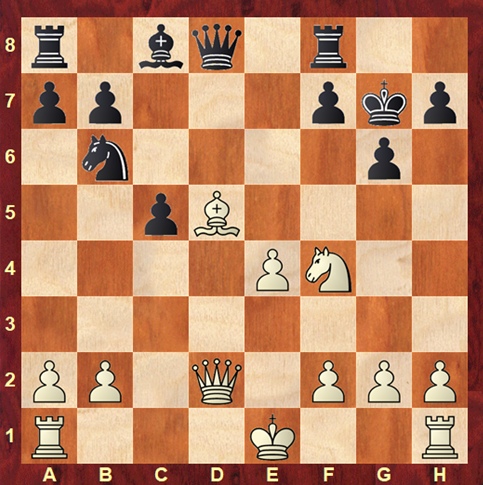
White’s last move 14.Nf4 is a novelty, but it’s not a move that will cause Grunfeld players sleepless nights. Either 14…Nxd5 or 14…Re8 were fine, but after 14…Qf6?! 15.0-0 Black started experiencing problems as now taking the bishop is met by Nxd5 and an attack on the exposed queen.
Black continued to play, neglecting his queenside development and was swiftly punished.
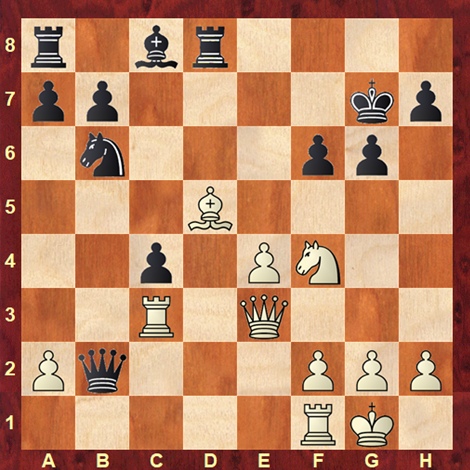
After 19.e5! Nxd5 20.exf6 Nxf7 21.Qe7 White regained the piece and had a mating attack without any investment of material. He won five moves later.
The team’s talisman, Kalintschew (2377) notched up a second win beating Lanc (2236) after the latter badly weakened the light squares in a King’s Indian Defence.
The games on boards two and four between Plachetka (2289) and Meister (2439) and Petran (2190) and Koehler (2189) were two calm draws.
England also won, but the amount of luck was similar to the one Stanojoski had against Arkell.

Legky (2357) and Nunn drew in a sharp and still playable position arising from the Benoni (after a transposition from the Four Pawns Attack in the King’s Indian).
Boudre (2245) – Chapman (2254) on board three was a dull draw as White displayed zero ambition from the opening onwards. Baker (2222) was a clear piece down against Giffard (2155) on board four, but miraculously managed to draw.
This left Kosten (2352) on board two against Roos (2253).
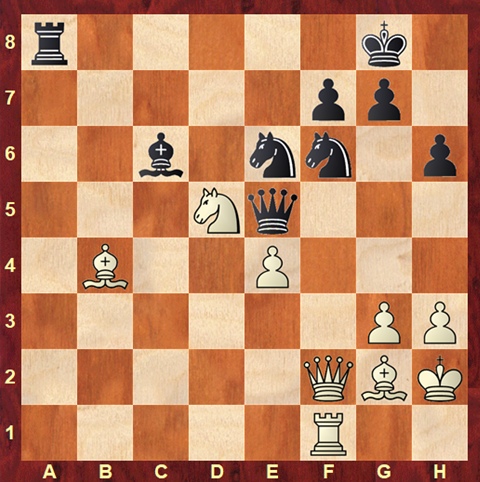
White’s last move was 27.Nd5 and it’s clear that the knight has to be taken with the bishop, since taking with the knight allows Qxf7. It would have kept the position balanced. However, Roos went for 27…Bb7?? allowing the simple 28.Bc3, with an imminent catastrophe on f6. The game lasted one more move after 28…Nxe4 29.Qxf7, as Black lost his queen.
The lucky win kept the English team within two points from the leaders, but since they lost to them, it is not very likely they can contest for gold, especially the way the German team keeps winning their matches.
After Round 6, there is a rest day, followed by the last three rounds. In round seven, in the S50 section Italy faces USA, Iceland will take on the host team of North Macedonia Alkaloid and England 1 plays England 2.
In the S65 section, Germany Lasker Schachstiftung GK plays France while England faces Israel.
Written by GM Alex Colovic
Photos: Mark Livshitz
Official website: seniorteam2023.fide.com/



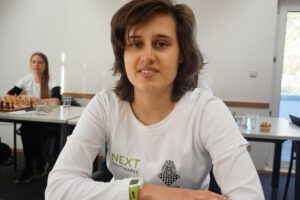


More Stories
Chess in New York: A walk through parks, clubs and history
FIDE World Rapid and Blitz in New York preview: An epic ending to 2024
Mannschafts-Weltmeisterschaft der Senioren
„Schach als Brücke für Frieden und Hoffnung“
Season’s greetings from FIDE President
Binz 2024: Doppelsieg für Taucha